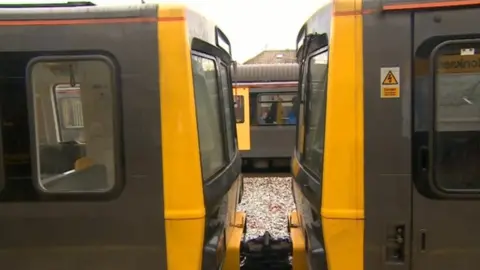Tyne and Wear Metro "unsustainable" finances given boost
 BBC
BBCThe Tyne and Wear Metro's "unsustainable" finances have been given a multimillion-pound boost.
Operator Nexus last month predicted a £4.1m deficit and potential shortfall of £21.6m by 2023, and warned it could lead to cuts to services.
However, new valuations of its pension fund surplus means it now expects to save an extra £3.4m per year.
This could protect services until at least 2022 without the need to use huge chunks of its £16m cash reserves.
The cash problems were attributed to lower than expected fare revenue, the cost of major repairs after catastrophic overhead line failures, and overtime paid to train crew because of staff shortages.
The Local Democracy Reporting Service said councillors were told by the finance chief of the North East Combined Authority that the financial situation has now improved "quite considerably".
Paul Darby said: "Unless anything else happens that we are not aware of, and we don't think there is anything we ought to have taken into account, there ought to be a balanced budget in 2020/21 and in 2021/22, with a modest use of reserves."
This would offer a window of two-and-a-half years to put together a long term financial plan to deal with the problems it could still face in the future.

Follow BBC North East & Cumbria on Twitter, Facebook and Instagram. Send your story ideas to [email protected].
